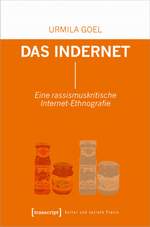She also told us that the embassy of a country from the global North had approached them and wanted to give them money to establish an lgbt (I do not know how far the embassy went in it's inclusion) organisation. They did not want the money. And in particular they did not want to be told from some embassy that they have to found an organisation. They know themselves what they want to do.
The lgbtqi activist also told us about an open gay blogger in Syria Gay Girl in Damascus.
PS 09.06.11: Gay Girl in Damascus has now been detained already several days. There is a Free Amina Abdalla Facebook site. German feminist blogs have published the news and now it also has reached the German newspaper taz.
It is good that there is so much publicity for 'Gay Gril in Damascus' and I hope it helps. But it has to be remembered - as was said at the Young Media Summit - there are (I am not sure whether I remember the correct number) something like 12.000 detainees in Syria and most of them do not have a facebook identity.
PS 12.06.11: The "Gay Girl in Damascus" seems to have been a hoax. One Syrian twitterer asks:
"Back to real activists in danger: are you going to support them like you supported "Amina"? or they have to be gay and speak English first?"
but says also:
"Re Amina hoax, I am utterly disgusted. That said, I'll always follow and love anonymous blogging till proved hoaxed."
0 Kommentare in: youngmediasummit ... comment ... link
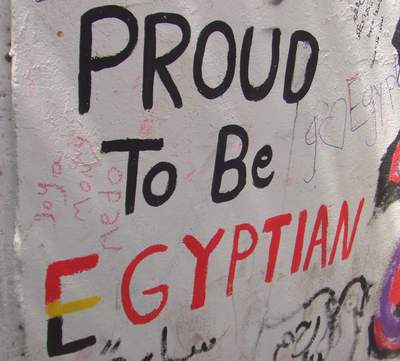
With some of the participants of the Young Media Summit I was talking about the nationalism within the revolution. Everywhere there are nationalist graffitis, flags dominate the protests. I suppose Egypt is referred to to unite the people against the regime. But this is always linked to exclusions.
One of the participants tells us that after a football match between Algeria and Egypt he was taking pictures of the celebrations in Cairo. After his flatemate was sexually harrased they went quickly away and attention was focussed on them. The crowd attacked them, alleging they were Algerians. Some protected them and so they were able to get away.
So Egyptian nationalism can be dangerous. Is there a possibilty of a revolution without nationalist slogans?
0 Kommentare in: youngmediasummit ... comment ... link
But at the closing dinner this non-hierarchical atmosphere was broken. We were not only handed out certificates, which certified that we had successfully completed the summit (could we have failed?).

But this was also staged in a totally hierarchical way. The three immediate organisers, their boss from Germany and a representative of the German embassy stood in the center of the room, each of our names was called out, we were supposed to go to them, get the certificate and a hand shake from all of them. There are several aspects to this staging. First of all, it implies that this certificate has an importance, it really does not have (it does not certify anything valuable - our participation is certified already sufficiently through the blog). Secondly it implies, that they can certify us something, thus establishing a clear hierarchy between us.
Worst of all, however, was the explanation, which I got later, when I complained about it. One of the Germans explained to me, that the Arabs like this, it is important for them and thus we did it. This argument I know from an organisation, which I used to work for and which was also engaged in working with the global South. Also then I often heard that the 'Others' (in Asia or wherever in the global South) like certificates, formalities, etc. and thus we do things like this. That is so very paternalistic, Orientalist, racist and a collectivisation of the majority of the world population. Why sbould all of 'them' like something we can benevolently bestow on them?
The Arab participant next to me disliked the gesture just as much as me. Told me that she had never experienced anything comparable and did not understand the point of it. But she was more polite than I was and did not complain. The next day she told me that she had talked to another Arab participant and she had said, she had not cared about the ceremony but participated out of politeness. The participant I talked to assumed the German organisers were doing the whole ceremony for the funders and to legitimise themselves.
From my experience I believe that they really believe that 'the Arabs' like getting certificates and thus we are back to (degrading) German perspectives on the Arab world.
0 Kommentare in: youngmediasummit ... comment ... link
During the summit these topics were not really part of the debate. The issues are different. A good experience for me to understand the Eurocentrism in my perspective and to provincialise Europe.
A next step would be (and then it really would be an Arab-German dialogue and not just a meeting of Arabs and Germans) to see what the transnational aspects of the Arab revolutions are, how the Germans/ Europeans are linked to it and how one can develop also joint agendas.
0 Kommentare in: youngmediasummit ... comment ... link
I used the term also here at the summit, when describing my means of income and had to explain what I meant by it. And somehow in this context it made so much less sense. There are revolutions going on, insecurity is there so much and so much more existential. My precarity is not very precarious in comparison.
0 Kommentare in: youngmediasummit ... comment ... link
- no Egyptian mobile number
- no smart phone
- no facebook
- no twitter
0 Kommentare in: youngmediasummit ... comment ... link
videos are nice image films (although almost totally lacking content and in their production a bit too invasive). The panel discussion at Cairo University could have been a good opportunity to discuss, if there had been an audience. The TV Talk Show helps in making the debates public.
So each of these publication forms (as well as the twittering, the facebook page and the flickr picture gallery) make sense in themselves. But in total they are a bit too much. We were so very output orientated that little time was left to produce content. Our blogposts were written in a hurry, the preparation for the panel discussion was 30 minutes, the TV show cost us a whole evening.
Less output orientation probably would have produced more interesting output. And I might have been able to blog during the summit.
0 Kommentare in: youngmediasummit ... comment ... link

There was a lot of mobilising for the protests yesterday on Tahrir Square. Since I did not go, I tried to follow what was happening in the media. Since I do not understand Arabic, I was looking for English or German media coverage. That was really difficult. From Twitter#May27 I got some idea. But there has been not much more that I found. Al Ahram has a story before and Al Jazeera a report on the protest. German media seem to be interested only in the oppening of the border to Gaza.
When you are not a specialist, it seems difficult to follow what happens in the Arab countries from Germany.

PS: In my German newspaper there was little on the Cairo protests, but one article on court hearing of blogger Hossam al-Hamalawy.
0 Kommentare in: youngmediasummit ... comment ... link
I want to be able to say things (also at public events), which will not be published. It is something different if somebody publishes an audio or video recording or a direct transcript of what I said and if people say that I said. In the latter case I can always claim that I was misquoted, in the first cases there is proof I said something. But if there is a danger of everything being quoted and published, then there is a restriction to what can be said in (semi) public and I would consider that a loss to debate culture.
I would like to have a discussion about the ethical limits of social media coverage.
0 Kommentare in: youngmediasummit ... comment ... link
Never move to a place where there are no elevators.
Never move to a place where there is no air conditioning.
Never move to a place where you have to use public transport.
Never move to a place where you get only sandwiches for lunch.
0 Kommentare in: youngmediasummit ... comment ... link
Yesterday I overheard a conversation between two journalists. The first told the second that s/he wanted to interview him/her, but that actually s/he did not need to really interview him/her, because s/he had already written the interview from things s/he had heard him/her saying in different conversations during the summit. So the second journalist only needed to read the interview and see what corrections were needed. And thus the interview was concluded.
But if it is an authorised text, not a transcript of an interview, why frame it as an interview? As a reader I have certain images, what an interview should be. And this production process does not fit with it. I would feel cheated, if I was presented by such an interview. It very much reminded me of the discussions around this years Kisch-Preis in Germany.
0 Kommentare in: youngmediasummit ... comment ... link
Yesterday at our panel discussion asked me where I am from. As far as I remember we were talking German. And I was wearing my Salwar Kamiz from Agra. So I told him first Germany and then "One can see that I am from Germany, can't one?" And he took it quiet well.
PS 28.05.11:The woman at the reception (in the new hotel) asked me where I am from, my name sounded interesting to her. She did not expect me answering Germany, but then without ado shifted to talk German with me, since she is German as well.
0 Kommentare in: youngmediasummit ... comment ... link
0 Kommentare in: youngmediasummit ... comment ... link
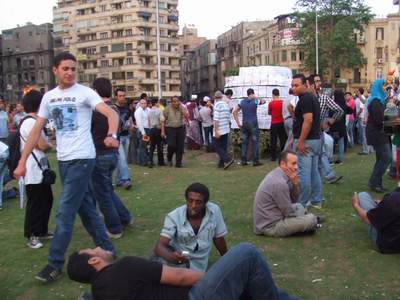
I am still sitting in my posh hotel room, taking advantage of the internet, the air conditioning and the safety. Today major protest are planed at Tahrir Square. Everybody is going there. I do not, because I am too illiterate. I know to little about the protest, Cairo and the language. I would hardly understand the things happening. And if it becomes dangerous, I would understand even less and be a burden on anybody taking care of me.
At the moment sitting in my hotel room, I hear a male voice outside. Most probably it is a praying voice, because at the moment it seems to be a religious chant. But it could also be something revolutionary (or something else). I just know too little. And that is why I will stay in a safe place, catering for illiterate people like me.
0 Kommentare in: youngmediasummit ... comment ... link
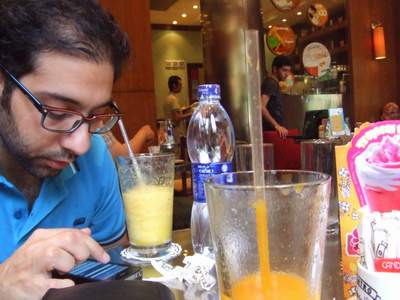
So drinking a cold drink, not having a smart phone and nothing to read with me, I had much time thinking about the new social media. Why is it that is so important to be always online? Why do you seem to forget the people around you? Don't you talk with each other anymore? Do I need a smart phone to be able to communicate with people?
Once the internet connection was established, my colleague got new information about what happens around us, told us about a blocked road close by. So yes, it makes sense to check the internet, especially in revolutionary times.
And he said he had needed a quiet time. I very much understand that.
Thus (non-)communication is much more complex than it seemed to me on the first glance.
0 Kommentare in: youngmediasummit ... comment ... link
PS: On the last day we have to fill in evaluation sheets. We comment on them not really being anonymous and my neighbour says, one can distinguish male and female handwritting. Looking at my evaluation sheet, he, however, has to admit that mine is not clearly female. Joining in the biologistic argument I argue that my handwritting is not so female because I have a small beard and my hormones are not ok. He seems confused.
0 Kommentare in: youngmediasummit ... comment ... link
There is more to blog about the last day, but it is already far too late in the night. I will do that later.
PS: 01.06.11: Michael's experiences are similar to mine.
0 Kommentare in: youngmediasummit ... comment ... link
I know that this post can be read as a conservative rejection of a new technology. And there might be some truth in this, because it is a technology I do not use. But at the same time I claim that we have to think about when synchronity of reporting makes sense and when maybe it is not so important or even a bad idea. Only because we have a technology we do not have to use it for all purposes and all the time.
And I am still wondering what the tweet of one of the participants that she is hiding her anti-feminism as so many participants are talking about feminism is meant to do. Is it making a statement against feminism for the other participants, who can follow the tweets, and is thus the opposite of hiding? If so, why is there the claim of hiding? I obviously do not get it.
PS 29.11.11: Currently the next Young Media Summit is staged in Tunis. Since I was a participant at the last one and I know some of the participants of the current one, I am interested in what is happening there. Thus I once in a while check their tweets and the Facebook site. Unfortunately, my impression from above, however, gets confirmed. The tweets provide me with totally unsatisfying information. Lots of it is totally uninteresting to me (in particular the advertisment posts in between for yms) and what is interesting is far too brief to get an impression of what is happening. Thus I have still not progressed in understanding why one should tweet from such a conference and why one should read the tweets.
1 Kommentar in: youngmediasummit ... comment ... link
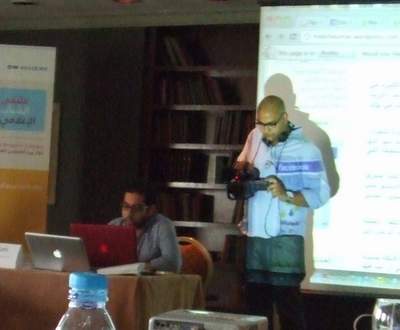
There is a video journalist following out conference. He is there most of the time, standing just in front of the speaker in order to get a good footage, holding his camera next to my head, disturbing a discussion. For me this filming seems very invasive. I am fine that I am filmed, but I do not want the camera and the video journalist to be so dominant. I want to listen and discuss in this group -that is my first priority. For me the filming should be of lower priority. Does film coverage have to be so invasive? Is media coverage more important than the event itself?
0 Kommentare in: youngmediasummit ... comment ... link
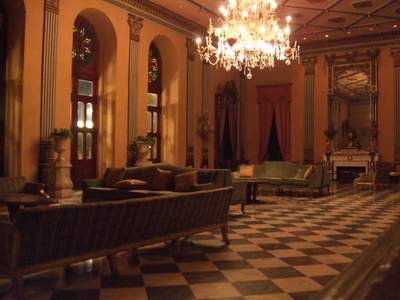
I engage with one in a discussion about migrant (domestic) workers (because I am interested in migrants from South Asia to this region) and talk about our privileges and their marginalisations. She gets into a very defensive mode, arguing that the domestic workers are treated well (since they are trusted the kids) and they give wrong accusations about being mistreated by their employers. She adds that she is working hard for her income as well and is not rich. That she can afford a driver, her sister has a domestic servant for her kids, who comes along to London, were they have a flat, etc. just seems normal to them.
Also another claims not to be rich, just comfortable. She drives a good car, has a blackberry, a very upper class habitus and the impression that the poor are less educated and thus more religious/ conservative.
These people are active in supporting the Arab revolutions, women's rights, etc., they are nice people and do good things. But I have a feeling that they do not question their class privileges much (I do that also much too little), that they reproduce classist exclusions and I ask myself, what consequences it has when it is these people who not only raise their voices but are also heard. And what it means that we privileged meet and network. What exclusions are we reproducing together?
2 Kommentare in: youngmediasummit ... comment ... link
I am learning lots and ask lots of questions.
0 Kommentare in: youngmediasummit ... comment ... link
0 Kommentare in: youngmediasummit ... comment ... link
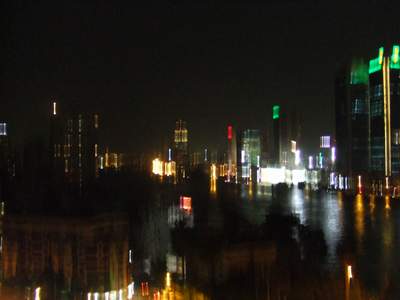
Heute abend bin ich in Kairo zum Young Media Summit angekommen.
Mal sehen, was ich alles zu erzählen haben werde. Gerade habe ich das Gefühl, dass ich erstmal vorallem hinschauen und hinhören sollte - und erstmal gar nicht so viel sagen. Ich lerne dazu.
0 Kommentare in: youngmediasummit ... comment ... link
Soviel zum Thema Gender, Pädagogik und Gewalt. Vorträge alleine reichen nicht, ab und zu braucht es auch praktische Erfahrung.
Und vielen Dank an die Kollegin für die Unterstützung!
2 Kommentare in: heteronormativ ... comment ... link
 Foto: © Anke Illing
Foto: © Anke Illing